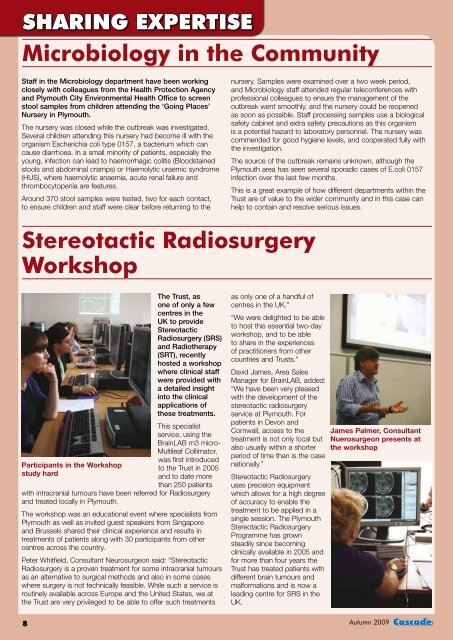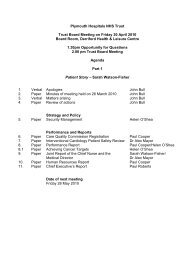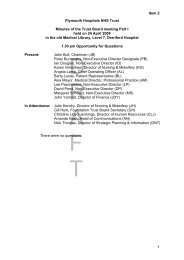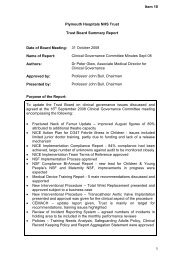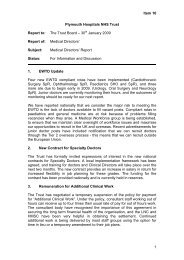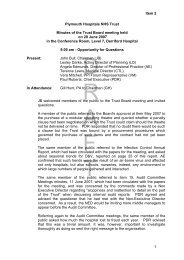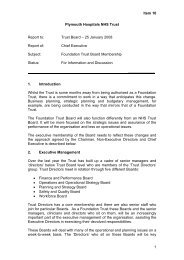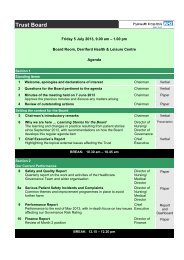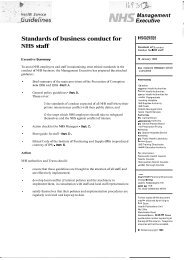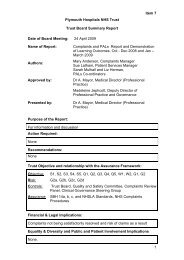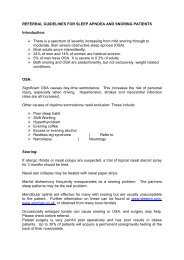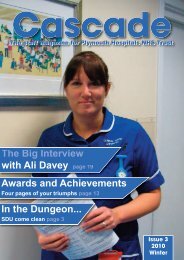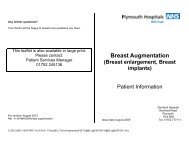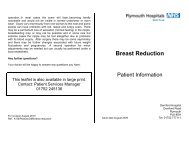Military Cross Award for Naval Medical Assistant Kate Nesbitt
Military Cross Award for Naval Medical Assistant Kate Nesbitt
Military Cross Award for Naval Medical Assistant Kate Nesbitt
You also want an ePaper? Increase the reach of your titles
YUMPU automatically turns print PDFs into web optimized ePapers that Google loves.
SHARING EXPERTISE<br />
Microbiology in the Community<br />
Staff in the Microbiology department have been working<br />
closely with colleagues from the Health Protection Agency<br />
and Plymouth City Environmental Health Office to screen<br />
stool samples from children attending the ‘Going Places’<br />
Nursery in Plymouth.<br />
The nursery was closed while the outbreak was investigated.<br />
Several children attending this nursery had become ill with the<br />
organism Escherichia coli type 0157, a bacterium which can<br />
cause diarrhoea. In a small minority of patients, especially the<br />
young, infection can lead to haemorrhagic colitis (Bloodstained<br />
stools and abdominal cramps) or Haemolytic uraemic syndrome<br />
(HUS), where haemolytic anaemia, acute renal failure and<br />
thrombocytopenia are features.<br />
Around 370 stool samples were tested, two <strong>for</strong> each contact,<br />
to ensure children and staff were clear be<strong>for</strong>e returning to the<br />
nursery. Samples were examined over a two week period,<br />
and Microbiology staff attended regular teleconferences with<br />
professional colleagues to ensure the management of the<br />
outbreak went smoothly, and the nursery could be reopened<br />
as soon as possible. Staff processing samples use a biological<br />
safety cabinet and extra safety precautions as this organism<br />
is a potential hazard to laboratory personnel. The nursery was<br />
commended <strong>for</strong> good hygiene levels, and cooperated fully with<br />
the investigation.<br />
The source of the outbreak remains unknown, although the<br />
Plymouth area has seen several sporadic cases of E.coli 0157<br />
infection over the last few months.<br />
This is a great example of how different departments within the<br />
Trust are of value to the wider community and in this case can<br />
help to contain and resolve serious issues.<br />
Stereotactic Radiosurgery<br />
Workshop<br />
Participants in the Workshop<br />
study hard<br />
The Trust, as<br />
one of only a few<br />
centres in the<br />
UK to provide<br />
Stereotactic<br />
Radiosurgery (SRS)<br />
and Radiotherapy<br />
(SRT), recently<br />
hosted a workshop<br />
where clinical staff<br />
were provided with<br />
a detailed insight<br />
into the clinical<br />
applications of<br />
these treatments.<br />
This specialist<br />
service, using the<br />
BrainLAB m3 micro-<br />
Multileaf Collimator,<br />
was first introduced<br />
to the Trust in 2005<br />
and to date more<br />
than 250 patients<br />
with intracranial tumours have been referred <strong>for</strong> Radiosurgery<br />
and treated locally in Plymouth.<br />
The workshop was an educational event where specialists from<br />
Plymouth as well as invited guest speakers from Singapore<br />
and Brussels shared their clinical experience and results in<br />
treatments of patients along with 30 participants from other<br />
centres across the country.<br />
Peter Whitfield, Consultant Neurosurgeon said: “Stereotactic<br />
Radiosurgery is a proven treatment <strong>for</strong> some intracranial tumours<br />
as an alternative to surgical methods and also in some cases<br />
where surgery is not technically feasible. While such a service is<br />
routinely available across Europe and the United States, we at<br />
the Trust are very privileged to be able to offer such treatments<br />
as only one of a handful of<br />
centres in the UK.”<br />
“We were delighted to be able<br />
to host this essential two-day<br />
workshop, and to be able<br />
to share in the experiences<br />
of practitioners from other<br />
countries and Trusts.”<br />
David James, Area Sales<br />
Manager <strong>for</strong> BrainLAB, added:<br />
“We have been very pleased<br />
with the development of the<br />
stereotactic radiosurgery<br />
service at Plymouth. For<br />
patients in Devon and<br />
Cornwall, access to the<br />
treatment is not only local but<br />
also usually within a shorter<br />
period of time than is the case<br />
nationally.”<br />
Stereotactic Radiosurgery<br />
uses precision equipment<br />
which allows <strong>for</strong> a high degree<br />
of accuracy to enable the<br />
treatment to be applied in a<br />
single session. The Plymouth<br />
Stereotactic Radiosurgery<br />
Programme has grown<br />
steadily since becoming<br />
clinically available in 2005 and<br />
<strong>for</strong> more than four years the<br />
Trust has treated patients with<br />
different brain tumours and<br />
mal<strong>for</strong>mations and is now a<br />
leading centre <strong>for</strong> SRS in the<br />
UK.<br />
James Palmer, Consultant<br />
Nuerosurgeon presents at<br />
the workshop<br />
8 Autumn 2009 Cascade


